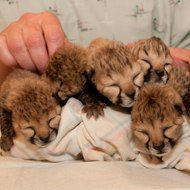
Zoo staff giving round-the-clock care to premature cubs
Five cheetah cubs are receiving critical care at Cincinnati Zoo after being delivered by a rare caesarian section earlier this month.
The zoo's veterinary team stepped in to perform the operation on 8 March and director of animal health Dr Campbell said the procedure was a success and five-year-old mother Willow is doing well.
It is only the third c-section that Dr Campbell has ever been involved in. Staff are now working around the clock to help the premature cubs to gain weight and strength. Important benchmarks for survival are the first week and month of life.
"The cubs were born under difficult circumstances," Dr Campbell explained. "For puppies and kittens the vast majority of their passive immunity comes from their mom's milk, especially the colostrum.
"Their immune systems are not very well developed at their time so they are unable to actively ward off infections.
"We are doing all we can to keep them healthy and strong, but it will be a challenge for these cubs moving forward."
The young cheetahs will remain in the zoo's nursery for at least eight to 12 weeks.
Cincinnati Zoo is one of nine accredited institutions that takes part in a cheetah breeding centre coalition in the US. It has been dubbed 'the cheetah capital of the world' due to its conservation efforts.
Cheetahs are an endangered species that has seen its global population shrink from around 100,000 at the turn of the 20th century, to an estimated 9,000-12,000 today.
Image © Cincinnati Zoo



 The Veterinary Medicines Directorate (VMD) is inviting applications from veterinary students to attend a one-week extramural studies (EMS) placement in July 2026.
The Veterinary Medicines Directorate (VMD) is inviting applications from veterinary students to attend a one-week extramural studies (EMS) placement in July 2026.